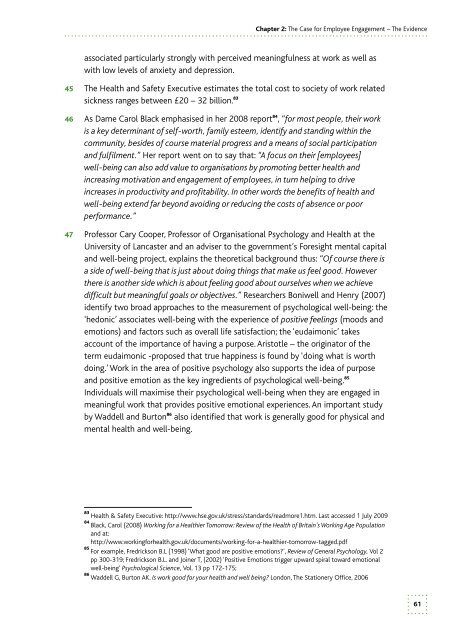3ytgeaf
3ytgeaf
3ytgeaf
Create successful ePaper yourself
Turn your PDF publications into a flip-book with our unique Google optimized e-Paper software.
Chapter 2: The Case for Employee Engagement – The Evidence<br />
associated particularly strongly with perceived meaningfulness at work as well as<br />
with low levels of anxiety and depression.<br />
45 The Health and Safety Executive estimates the total cost to society of work related<br />
sickness ranges between £20 – 32 billion. 83<br />
46 As Dame Carol Black emphasised in her 2008 report 84 , “for most people, their work<br />
is a key determinant of self-worth, family esteem, identify and standing within the<br />
community, besides of course material progress and a means of social participation<br />
and fulfilment.” Her report went on to say that: “A focus on their [employees]<br />
well-being can also add value to organisations by promoting better health and<br />
increasing motivation and engagement of employees, in turn helping to drive<br />
increases in productivity and profitability. In other words the benefits of health and<br />
well-being extend far beyond avoiding or reducing the costs of absence or poor<br />
performance.”<br />
47 Professor Cary Cooper, Professor of Organisational Psychology and Health at the<br />
University of Lancaster and an adviser to the government’s Foresight mental capital<br />
and well-being project, explains the theoretical background thus: “Of course there is<br />
a side of well-being that is just about doing things that make us feel good. However<br />
there is another side which is about feeling good about ourselves when we achieve<br />
difficult but meaningful goals or objectives.” Researchers Boniwell and Henry (2007)<br />
identify two broad approaches to the measurement of psychological well-being: the<br />
‘hedonic’ associates well-being with the experience of positive feelings (moods and<br />
emotions) and factors such as overall life satisfaction; the ‘eudaimonic’ takes<br />
account of the importance of having a purpose. Aristotle – the originator of the<br />
term eudaimonic -proposed that true happiness is found by ‘doing what is worth<br />
doing.’ Work in the area of positive psychology also supports the idea of purpose<br />
and positive emotion as the key ingredients of psychological well-being. 85<br />
Individuals will maximise their psychological well-being when they are engaged in<br />
meaningful work that provides positive emotional experiences. An important study<br />
by Waddell and Burton 86 also identified that work is generally good for physical and<br />
mental health and well-being.<br />
83<br />
Health & Safety Executive: http://www.hse.gov.uk/stress/standards/readmore1.htm. Last accessed 1 July 2009<br />
84<br />
Black, Carol (2008) Working for a Healthier Tomorrow: Review of the Health of Britain’s Working Age Population<br />
and at:<br />
http://www.workingforhealth.gov.uk/documents/working-for-a-healthier-tomorrow-tagged.pdf<br />
85<br />
For example, Fredrickson B.L (1998) ‘What good are positive emotions’, Review of General Psychology, Vol 2<br />
pp 300-319; Fredrickson B.L. and Joiner T, (2002) ‘Positive Emotions trigger upward spiral toward emotional<br />
well-being’ Psychological Science, Vol. 13 pp 172-175;<br />
86<br />
Waddell G, Burton AK. Is work good for your health and well being London, The Stationery Office, 2006<br />
61


